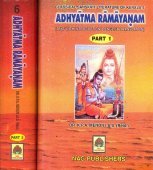Itihasa, Itihāsa, Iti-hasa: 24 definitions
Introduction:
Itihasa means something in Buddhism, Pali, Hinduism, Sanskrit, the history of ancient India, Marathi, Hindi. If you want to know the exact meaning, history, etymology or English translation of this term then check out the descriptions on this page. Add your comment or reference to a book if you want to contribute to this summary article.
Alternative spellings of this word include Itihas.
Images (photo gallery)
In Hinduism
Purana and Itihasa (epic history)
Source: archive.org: Shiva Purana - English TranslationItihāsa (इतिहास) refers to an “ancient story”, according to the Śivapurāṇa 2.3.35 (“The story of Padmā and Pippalāda”).—Accordingly, as Vasiṣṭha said to Himavat mount (Himācala): “[...] All kinds of riches were granted to the couple increasing their happiness. They were conducive to the prosperity here and hereafter. O lord of mountains, this ancient story (itihāsa) of the couple has been narrated to you. You have heard the story with pleasure and respect. Knowing the real situation give your daughter Pārvatī to Śiva. Cast off sins, O lord of mountains, in the company of your wife Mena. [...]”.
Source: Cologne Digital Sanskrit Dictionaries: The Purana IndexItihāsa (इतिहास).—(Purāṇa)—Historical literature known to Sūta;1 the fifth Veda; their origin; to be read or heard on days of fasting;2 came in a personified form, to see Trivikrama Hari.3
- 1) Bhāgavata-purāṇa I. 1. 6; Matsya-purāṇa 57. 15; 58. 4; 69. 33; 72. 6; 247. 17.
- 2) Bhāgavata-purāṇa I. 4. 20, 22; III. 12. 39; Matsya-purāṇa 99. 11; Vāyu-purāṇa 54. 115; 55. 2; 60. 16; 79. 53; 104. 2; Viṣṇu-purāṇa I. 22. 83; III. 4. 10; V. 1. 38.
- 3) Bhāgavata-purāṇa VIII. 21. 2; Brahmāṇḍa-purāṇa I. 1. 171; II. 34. 16; III. 15. 25; IV. 4. 47, 56; 7. 9; Vāyu-purāṇa I. 25, 32.

The Purana (पुराण, purāṇas) refers to Sanskrit literature preserving ancient India’s vast cultural history, including historical legends, religious ceremonies, various arts and sciences. The eighteen mahapuranas total over 400,000 shlokas (metrical couplets) and date to at least several centuries BCE.
Vaishnavism (Vaishava dharma)
Source: Pure Bhakti: Brhad BhagavatamrtamItihāsa (इतिहास) refers to:—A history. (cf. Glossary page from Śrī Bṛhad-bhāgavatāmṛta).

Vaishnava (वैष्णव, vaiṣṇava) or vaishnavism (vaiṣṇavism) represents a tradition of Hinduism worshipping Vishnu as the supreme Lord. Similar to the Shaktism and Shaivism traditions, Vaishnavism also developed as an individual movement, famous for its exposition of the dashavatara (‘ten avatars of Vishnu’).
Kavyashastra (science of poetry)
Source: Shodhganga: Bhismacaritam a critical studyItihāsa (इतिहास) (iti-ha-āsa) literally ‘so it was’ and Purāṇa literally ‘old’ are almost synonymous, and these terms are found associated with each other in the early literature. The word Itihāsa may become a saying, proverb rather than a legend. In this sense the words Gītā; and Gāthā; were also used. Gāthā; need not necessarily be sung and means only a proverbial verse. In the extant literature, the terms Itihāsa and Purāṇa have acquired a distinct use. Itihāsa may correspond to an epic and Purāṇa to a series of narrations, without the main porp of a running tale, meant solely to explain cosmological and theological tenets.
The Rāmāyaṇa and the Mahābhārata are found to be the original epics. The compiled, revised and researched forms of these two have originated the new tradition of epics. As per Jayakishan Khandelwal’s reference, amongst both, the Rāmāyaṇa is more poetic and less historic, while the Mahābhārata is more historic and less poetic. Hence, the Rāmāyaṇa is the father of decorated epics.

Kavyashastra (काव्यशास्त्र, kāvyaśāstra) refers to the ancient Indian tradition of poetry (kavya). Canonical literature (shastra) of the includes encyclopedic manuals dealing with prosody, rhetoric and various other guidelines serving to teach the poet how to compose literature.
General definition (in Hinduism)
Source: Advaita Academy: HinduismItihāsa is primarily a historical narrative in verse with an element of myth in it, with several interludes on morality, metaphysics, statecraft and other issues. Itihāsa was meant to popularize the message of the Vedas through stories of kings, and other ideal persons. Mahabharata is such an Itihāsa where there are innumerable case studies on dharma.
Source: WikiPedia: HinduismItihas ("so indeed it was") as defined by Amarakosha (I.6.4) refers to purvavritta, i.e. events of the past. In the Vedic age, those portions of the Brahmanas which narrated events of bygone days were known as itihasa and had some ritualistic importance. The recitation of the itihasa-purana in the pariplava nights was a part of the Asvamedha ritual. Later, the connotation of the term widened to cover all such narratives which related to past events.
Source: Institute of Sri Ramchandra Consciousness: A Handbook of Hindu Religion: LiteratureItihāsa (इतिहास):—The Itihāsas describe how the duties taught in our Smṛtis are discharged by different individuals, how men should act when there is apparent conflict of duties, and thereby create in the minds of people a desire to follow dharma and to shun adharma. The Itihāsas are the Rāmāyana and the Mahābhārata.
In Buddhism
Mahayana (major branch of Buddhism)
Source: academia.edu: A Study and Translation of the GaganagañjaparipṛcchāItihāsa (इतिहास) [=Itihāsaka?] refers to a “narrative of the past”, according to the Mahāvyutpatti (Cf. Bhūtapūrva in the Gaganagañjaparipṛcchā: the eighth chapter of the Mahāsaṃnipāta—a collection of Mahāyāna Buddhist Sūtras).

Mahayana (महायान, mahāyāna) is a major branch of Buddhism focusing on the path of a Bodhisattva (spiritual aspirants/ enlightened beings). Extant literature is vast and primarely composed in the Sanskrit language. There are many sūtras of which some of the earliest are the various Prajñāpāramitā sūtras.
India history and geography
Source: Cologne Digital Sanskrit Dictionaries: Indian Epigraphical GlossaryItihāsa.—(EI 13), legendary lore. J Note: itihāsa is defined in the “Indian epigraphical glossary” as it can be found on ancient inscriptions commonly written in Sanskrit, Prakrit or Dravidian languages.

The history of India traces the identification of countries, villages, towns and other regions of India, as well as mythology, zoology, royal dynasties, rulers, tribes, local festivities and traditions and regional languages. Ancient India enjoyed religious freedom and encourages the path of Dharma, a concept common to Buddhism, Hinduism, and Jainism.
Languages of India and abroad
Pali-English dictionary
Source: BuddhaSasana: Concise Pali-English Dictionaryitihāsa : (m.) history; tradition.
Source: Sutta: The Pali Text Society's Pali-English DictionaryItihāsa refers to: (= iti ha āsa, preserving the Vedic form āsa, 3rd sg. perf. of atthi) “thus indeed it has been”, legendary lore, oral tradition, history; usually mentioned as a branch of brahmanic learning, in phrase itihāsa-pañca-mānaṃ padako veyyākaraṇo etc. D. I, 88 = (see DA. I, 247); A. I, 163; III, 223; Sn. 447, 1020. Cp. also M Vastu I. 556.—hītiha (itiha + itiha) “so & so” talk, gossip, oral tradition, belief by hearsay etc. (cp. itikirā & anītiha. Nd2 spells ītihītiha) M. I, 520; S. I, 154; Sn. 1084; Nd2 151. (Page 118)
Note: itihāsa is a Pali compound consisting of the words iti and hāsa.

Pali is the language of the Tipiṭaka, which is the sacred canon of Theravāda Buddhism and contains much of the Buddha’s speech. Closeley related to Sanskrit, both languages are used interchangeably between religions.
Marathi-English dictionary
Source: DDSA: The Molesworth Marathi and English Dictionaryitihāsa (इतिहास).—m (S) History; written or traditional account of. This word is used interchangeably with śabda as a form of pramāṇa or Proof. See ex. under pramāṇa. 2 A detailed account of an affair gen.
Source: DDSA: The Aryabhusan school dictionary, Marathi-Englishitihāsa (इतिहास).—m History; a detailed account of an affair.
Marathi is an Indo-European language having over 70 million native speakers people in (predominantly) Maharashtra India. Marathi, like many other Indo-Aryan languages, evolved from early forms of Prakrit, which itself is a subset of Sanskrit, one of the most ancient languages of the world.
Sanskrit dictionary
Source: DDSA: The practical Sanskrit-English dictionaryItihāsa (इतिहास).—[fr. iti-ha-āsa (3rd. pers. sing. Perf. of as to be); so it has been] (
1) History (legendary or traditional); धर्मार्थकाममोक्षाणामुपदेशसमन्वितम् पूर्ववृत्तं कथा- युक्तमितिहासं प्रचक्षते (dharmārthakāmamokṣāṇāmupadeśasamanvitam pūrvavṛttaṃ kathā- yuktamitihāsaṃ pracakṣate); Mb. cf. also आर्यादिबहुव्याख्यानं देवर्षि- चरिताश्रयम् । इतिहासमिति प्रोक्तं भविष्याद्भुतधर्मयुक् (āryādibahuvyākhyānaṃ devarṣi- caritāśrayam | itihāsamiti proktaṃ bhaviṣyādbhutadharmayuk) ||
2) Heroic history (such as the Mahābhārata).
3) Historical evidence, tradition (which is recognized as a proof by the Paurāṇikas).
Derivable forms: itihāsaḥ (इतिहासः).
Source: Cologne Digital Sanskrit Dictionaries: Shabda-Sagara Sanskrit-English DictionaryItihāsa (इतिहास).—m.
(-saḥ) History, traditional accounts of former events, heroic history, as the Mahabharata and Ramayana. E. itiha traditional instruction, as to be, and ghañ aff.
Source: Cologne Digital Sanskrit Dictionaries: Benfey Sanskrit-English DictionaryItihāsa (इतिहास).—i. e. iti-ha-āsa (the last part is the third sing. of the pf. of 1. as) m. Traditional account, a legend, [Mānavadharmaśāstra] 3, 232.
Source: Cologne Digital Sanskrit Dictionaries: Cappeller Sanskrit-English DictionaryItihāsa (इतिहास).—[masculine] story, legend, tradition.
Source: Cologne Digital Sanskrit Dictionaries: Aufrecht Catalogus CatalogorumItihāsa (इतिहास) as mentioned in Aufrecht’s Catalogus Catalogorum:—Oppert. 6501.
—by Vasiṣṭha. B. 2, 128.
—by Vyāsa. B. 2, 128. Oppert. Ii, 5644.
1) Itihāsa (इतिहास):—[=iti-hāsa] [from iti] a see below
2) [=iti-hāsa] [from iti-ha > iti] b m. (iti-ha-āsa, ‘so indeed it was’), talk, legend, tradition, history, traditional accounts of former events, heroic history, [Śatapatha-brāhmaṇa; Mahābhārata; Manu-smṛti etc.]
Source: Cologne Digital Sanskrit Dictionaries: Yates Sanskrit-English DictionaryItihāsa (इतिहास):—[itihā+sa] (saḥ) 1. m. History.
[Sanskrit to German]
Sanskrit, also spelled संस्कृतम् (saṃskṛtam), is an ancient language of India commonly seen as the grandmother of the Indo-European language family (even English!). Closely allied with Prakrit and Pali, Sanskrit is more exhaustive in both grammar and terms and has the most extensive collection of literature in the world, greatly surpassing its sister-languages Greek and Latin.
Hindi dictionary
Source: DDSA: A practical Hindi-English dictionaryItihāsa (इतिहास) [Also spelled itihas]:—(nm) history; ~[kāra] a historian; ~[vettā] a scholar of history.
...
Kannada-English dictionary
Source: Alar: Kannada-English corpusItihāsa (ಇತಿಹಾಸ):—
1) [noun] an account, in a narrative from, of what has or might have happened, esp. in chronological order with analysis and explanation; history.
2) [noun] a traditional account handed down for generations among a people and believed to have a historical basis; a legend.
Kannada is a Dravidian language (as opposed to the Indo-European language family) mainly spoken in the southwestern region of India.
See also (Relevant definitions)
Starts with: Itihasagara, Itihasajna, Itihasaka, Itihasakara, Itihasakatha, Itihasanibandhana, Itihasapurana, Itihasasamuccaya, Itihasasamuccayasamgraha, Itihasavada, Itihasavakya, Itihasaveda, Itihasavid, Itihasopanishad.
Ends with: Bharatetihasa.
Full-text (+55): Aitihasika, Itihasapurana, Purana, Smriti, Itihasasamuccaya, Itihasaka, Itihasavada, Itihas, Itihasopanishad, Kshemadarshiya, Upappirummanam, Ashvabandhana, Itihasanibandhana, Mahadbhuta, Kshemadarshin, Mankigita, Mantraputa, Aptavac, Athabbana, Vasishtha.
Relevant text
Search found 112 books and stories containing Itihasa, Itihāsa, Iti-hasa, Iti-hāsa; (plurals include: Itihasas, Itihāsas, hasas, hāsas). You can also click to the full overview containing English textual excerpts. Below are direct links for the most relevant articles:
Historical Elements in the Matsya Purana (by Chaitali Kadia)
Purāṇa and Itihāsa < [Chapter 1 - An Introduction of the Purāṇas]
Relation between History and Purāṇa < [Chapter 2 - History and Historical elements]
Historical enquiries of Purāṇas < [Chapter 2 - History and Historical elements]
Atharvaveda and Charaka Samhita (by Laxmi Maji)
Aims of the present work < [Chapter 1 - Introduction]
Āyurveda and the Vedas < [Chapter 1 - Introduction]
Mādhavakara (Āyurveda scholar) < [Chapter 1 - Introduction]
Animal Kingdom (Tiryak) in Epics (by Saranya P.S)
Chapter 1.1 - Itihasa (Introduction)
Chapter 6.1 - Akhyana (Epic narrative)—Introduction
Garga Samhita (English) (by Danavir Goswami)
Verse 4.15.15 < [Chapter 15 - The Story of the Women of Barhiṣmatī-pura, the Apsarās, and the Women of Sutala and Nāgendra]
Verse 3.10.1 < [Chapter 10 - The Glory of Śrī Girirāja]
Verse 6.10.16 < [Chapter 10 - In the Description of the Gomatī River, the Glories of Cakra-tīrtha]
Samkhya thoughts in the Mahabharata (by Shini M.V.)
Introduction to Itihāsa < [Chapter 1 - Introduction]
Resume < [Chapter 1 - Introduction]
Introduction to Indian philosophy < [Chapter 1 - Introduction]
Chaitanya Bhagavata (by Bhumipati Dāsa)
Verse 3.3.510-511 < [Chapter 3 - Mahāprabhu’s Deliverance of Sarvabhauma, Exhibition of His Six-armed Form, and Journey to Bengal]
Verse 1.2.8 < [Chapter 2 - The Lord’s Appearance]
Verse 1.1.31 < [Chapter 1 - Summary of Lord Gaura’s Pastimes]
Related products




